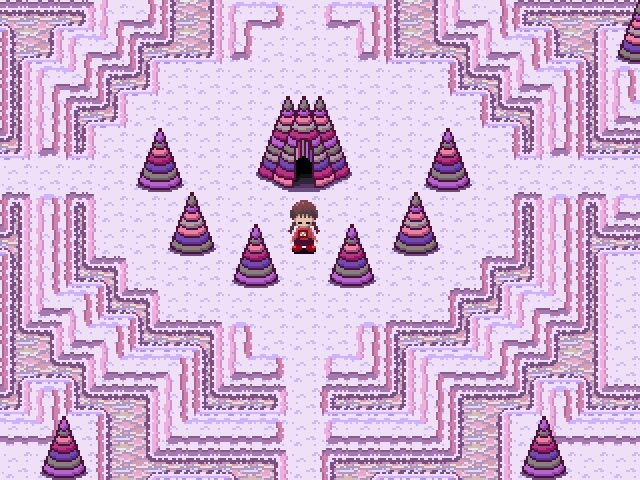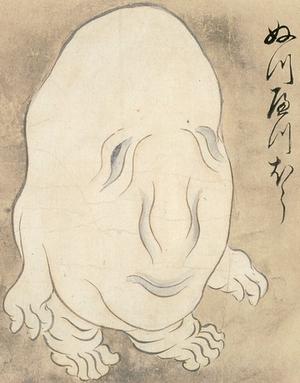Poniko(Imaginary friend)
※With a Japanese person since Madotsuki calls it "駄目(dame)" and "無理(muri)" in Japanese?
Imaginary friends and imaginary companions are a psychological and social disorder where a friendship or other interpersonal relationship takes place in the imagination rather than external physical reality. Imaginary friends are fictional characters created for improvisational role-playing. They often have elaborate personalities and behaviors. They may seem real to their creators, though they are ultimately unreal, as shown by studies.[1] The first studies focusing on imaginary friends are believed to have been conducted during the 1890s.[2]
※Madotsuki in childhood, sometimes in adolescence, and rarely in adulthood?
Imaginary friends are made often in childhood, sometimes in adolescence, and rarely in adulthood. They often function as tutelaries when played with by a child. They reveal, according to several theories of psychology, a child's anxieties, fears, goals and perceptions of the world through that child's conversations.[citation needed] They are, according to some children, physically indistinguishable from real people, while others say they see their imaginary friends only in their heads.[citation needed]
Poniko(解離性同一性障害)
※Imaginary friends are the signs of Dissociative Identity Disorder?
解離性同一性障害(かいりせいどういつせいしょうがい、英: Dissociative Identity Disorder ; DID)は、解離性障害のひとつである。かつては多重人格障害(英: Multiple Personality Disorder ; MPD)と呼ばれていた[注 1]。
イマジナリーフレンド(イマジナリーコンパニオンとも)は座敷童と考えれば理解しやすい。 これは正常である。
※Madotsuki is the woman of infancy(after the birth 1 years old ~ 6 years old or 7 years old) and is an only child?
幼児期には20%から30%もその体験を持つ者がいて一人っ子か女性の第一子に多い。
There are those who have the experience 20 to no less than 30% at infancy, and there are many to an only child or the first female child.
※Madotsuki is using a women's toilet and men's toilets is the age which does not still have the consciousness of the opposite sex?→(which identity becomes rigid, around the ages of 5–7 years?)
http://yumenikki.wikia.com/wiki/Restroom(name)#Restroom.28Gender_identity.29
2歳から4歳の間に生まれ、8歳ぐらいの間に消えてしまう[99][100][101][注 50]。
※"Lizard icon" of the Menu is a mark of intellect and creativity?
http://yumenikki.wikia.com/wiki/NASU(name)#NASU.28Hopi.27s_motif.29
イマジナリーフレンドを持つ子供は空想力が豊かであり、しばしば知性と創造性のしるしとみなされることもある[102]。 これは病的な交代人格状態とははっきりと区別される[103]。
The child with an imaginary friend has rich imagination, and it may often be considered that he is a mark of intellect and creativity [102].
This is clearly distinguished from a morbid shift character state [103].
『わかりやすい「解離性障害」入門』に4つの事例が報告されている[104]。
Uboa(Nuppeppō)
絵巻には名前と絵があるに過ぎず、解説文の記述は一切ないためにどのような妖怪を意図して描かれたものかは想像の域を出ないが、その名前や、洒落本『新吾左出放題盲牛』(出版年不詳)に「ぬっぺっほうといふ化けもの有り、目もなく耳も無く」とあることから、のっぺらぼうの一種と見られている[1][2]。
また妖怪研究家の多田克己は、のっぺらぼうは現在では顔に目鼻がまったくない妖怪として知られているが、古くはこのぬっぺふほふのように顔と体の区別のつかない形態のものだったとしている。
顔に白粉をぬっぺりと塗った様を「白化」というが、この「白化」には「しらばっくれる、とぼける」「明け透けに打ち明けて言うと見せかけて騙す」「露骨になる」「白粉で装う」「白い化物」などの意味がある。
Although the appearance which applied face powder to the face with doping is called "chlorosis", this "chlorosis" has meanings, such as "it carries out, and pretends ignorance", "it pretending to reveal straightforwardly and to say and deceiving", "it becoming candid", "it being dressed with face powder", and "a white ghost."
その「白化」の意味の体現により、ぬっぺふほふはまず人間に成りすまして(しらばっくれて)通行人に近づき、親しげに会話をし(明け透けに打ち解け)、相手が油断したところで正体を現し(露骨になり)、本来の姿(白粉をべったり塗ったような白い化物)を見せるのだという[3]。
By body expression of the meaning of the "chlorosis", it approaches a passerby (carrying out) with ぬっぺふほふ first in the disguise of man, It talks friendly (being straightforwardly frank), true character of is shown in the place where the partner was inattentive (becoming candid), and it is said that a normal state of being (white ghost which applied face powder fast) is shown [3].
Uboa(Nuppeppō)
※Uboa estimated to be up to 1.5m in height too?(Relation between height with Madotsuki, and age)
In Japanese folklore the Nuppeppō (ぬっぺっぽう?) (also known as Nuppefuhō) is a yōkai that is genderless and estimated to be up to 1.5m in height.



